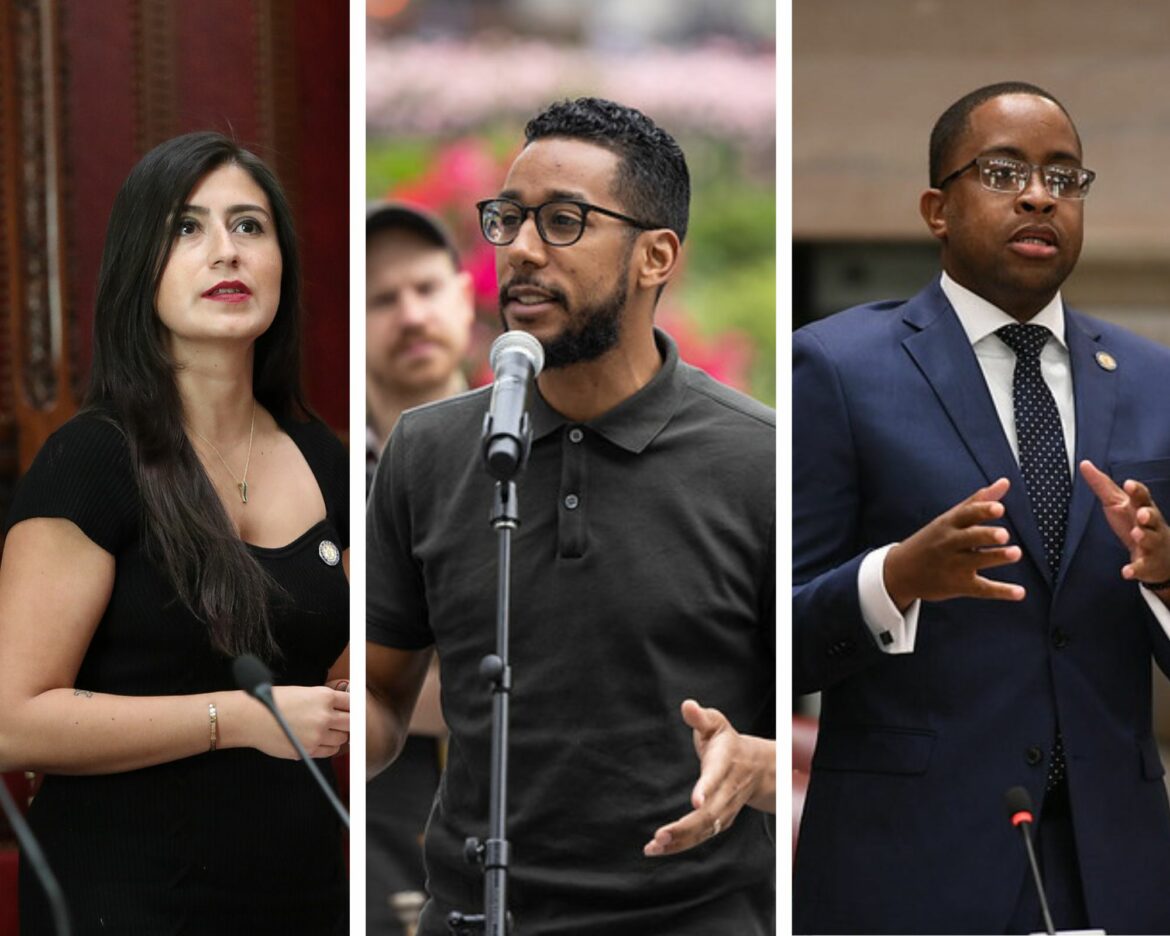“We are now witnessing a new generation of Latino political representatives, many of whom have arrived in the halls of government with great potential and ambition. A few of them have even been mentioned as potential opponents to the current mayor in the 2025 municipal elections.”

Gregg Richards/Brooklyn Borough President, NYS Senate Media Services
From left to right: State Sen. Jessica Ramos, Brooklyn Borough President Antonio Reynoso and State Sen. Zellnor MyrieThe recent celebration of Hispanic Heritage Month was a most appropriate time to remember the contributions of Latinos to New York politics. Once spoken of as a sleeping giant, today Latinos make up almost 30 percent of all city residents, and are the largest ethnic voting group in Gotham, constituting almost a quarter of all registered voters. In terms of raw numbers, we could easily say that the sleeping giant has awakened.
While Latinos are still underrepresented at various levels of state and city governments, we are now witnessing a new generation of Latino political representatives, many of whom have arrived in the halls of government with great potential and ambition. A few of them have even been mentioned as potential opponents to the current mayor in the 2025 municipal elections. Indeed, of the four most frequently mentioned potential challengers, three are Latino.
First, we have the current Brooklyn Borough President, Antonio Reynoso. Before his tenure in Brooklyn Borough Hall, Reynoso served two terms as a city councilman, and began his work in politics as an organizer for the now-defunct organization, ACORN. Reynoso has long been a darling of the progressive Left movement in New York, as evidenced by progressive leaders’ recent meeting to discuss the possibilities of endorsing a candidate to challenge Mayor Eric Adams. Not only was Reynoso mentioned as a possible candidate, he was the only elected official present at the gathering in an unlikely locale for such discussions—Staten Island.
Though the powers of the borough presidency have dwindled significantly, the perch has proved to be a stepping for higher office. Such was the case for Scott Stringer, who was elected city comptroller in 2013 after serving as Manhattan Borough President for eight years. And of course, for eight years, our current mayor also occupied the very seat Reynoso does now.
While the position can serve as a bully pulpit to champion issues that are important to a vast constituency, for Reynoso the timing of running for mayor would be a bit complicated: he would have to forgo a re-election effort for his seat, since borough president races run in the same cycle as those for mayor.
The second potential challenger—State Senator Jessica Ramos—does not have to worry about losing a currently held seat. Since state legislative races are held in even numbered years, and municipal elections in odd years, Ramos has the luxury of setting her sights on Gracie Mansion without giving up her senate position. She has quite possibly received the most media attention of all the possible candidates I am mentioning, particularly in light of the migrant crisis engulfing our city.
Ramos is not only a fierce advocate for the proper care and management of city resources on behalf of migrants, she herself comes from a family that understands very well the plight of those seeking a better life in Gotham.
Ramos’ parents migrated to New York from Colombia, putting down roots in a city that has seen one of their own rise to stardom in the senate and in city politics. Ramos worked in labor and now chairs the labor committee in the Senate. She is articulate and whip smart, and will certainly be considered for higher office for years to come.
Zellnor Myrie, one of Ramos’ colleagues in the senate, is a third possible contender for the mayoralty. Myrie’s parents arrived in New York from Costa Rica. His credentials are quite impressive: after his graduation from Brooklyn Technical High School, Myrie graduated from Fordham University and received his law degree from the prestigious Cornell Law School.
Interestingly enough, Myrie already has some history with Mayor Adams. In 2018, as a first-time candidate, Myrie took on the then-incumbent Senator Jesse Hamilton, a protégé of Adams, whom Hamilton succeeded in the Senate. Myrie defeated Hamilton rather impressively. But it is chiefly his hard work and intelligence as an advocate for election reform and ballot access that has won Myrie many supporters.
Any of these Latinos would present a potentially formidable challenge to Adams, particularly since Latinos were a pivotal voting bloc for the mayor. As I have previously mentioned, Adams received just over 50 percent of support in many Latino precincts in the Bronx, and received a plurality of the overall Latino vote. Any of these candidates— and perhaps Ramos in particular because of her long-standing work in Latino neighborhoods—could wrestle this bloc away from Adams, impeding him from replicating the same coalition that led him to victory in 2021.
Latino voters are no longer the only force with which our city’s politics must reckon: so too is the new generation of Latino leaders.
Eli Valentin is a longtime Gotham Gazette contributor, founder of the Institute for Latino Politics and executive director of a new Latino studies program at Virginia Union University. He lives in New York with his family.








